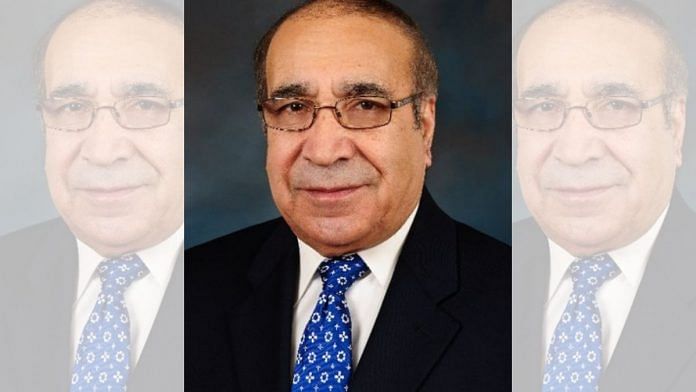New Delhi: Afghanistan’s former interior minister Ali Ahmad Jalali could be the country’s next president as the Taliban reached the gates of Kabul, ready to take charge of the country while incumbent President Ashraf Ghani found himself increasingly isolated in the fight against the Islamic Emirate.
According to a highly placed Afghan official with direct knowledge of the scorching pace of developments, Jalali is a compromise candidate who is acceptable both to the Afghan government and the Taliban. As of Sunday afternoon, Jalali was being flown from Washington, where he currently lives and works at the National Defense University, to Kabul, the official said.
“The rapid fall of one-third of Afghanistan provincial capitals within one week belies the much-hyped claims of tenacity of the Afghan National Defense and security forces as they fast crumbled in the face of advancing insurgent fighters,” Jalali tweeted on 13 August.
“This brings to mind an old military adage,” Jalali added in another tweet, saying, “Those who governed well did not arm; those who were armed well did not draw battle lines; those who drew battle lines well did not fight; those who fought well did not lose; those who lost well did not perish.”
The dramatic developments over the last 48 hours — during which all the major cities including Mazar-i-Sharif, Jalalabad, Kandahar and Herat have fallen — has lent credence to the notion that the Taliban will dictate terms to the Afghan republic as well as to the rest of the international community.
Taliban’s Mohammed Abbas Stanekzai and Mullah Baradar, top leaders of the Islamic Emirate headquartered in Qatar who have been in negotiations with the Americans and Afghan representatives in Doha this past year, reached Kabul Sunday.
They were received by the head of the High Council for National Reconciliation group, Dr Abdullah Abdullah, indicating an acceptance by the Afghans as well as the US of a grim reality.
The arrival of the Taliban leaders is, of course, a sign of preparation to take over Kabul, the Afghan official said, but Afghan negotiators are also holding out on the kind of takeover.
Dr Abdullah is likely to head the negotiating team, as he has been doing during the Doha talks; he clearly knows the Taliban the best.
Also read: 400,000 people displaced as Taliban advances in Afghanistan fuel humanitarian crisis
How negotiations could pan out
According to the Afghan source, there are three broad areas of negotiation. First, the Afghan government is demanding a general amnesty for the people — meaning, there will be no brutality or killing of women, children and civilians, like there was in 1996, when the Taliban took Kabul.
Second, if the Taliban is hell-bent on taking revenge, then the international community will not accord it the recognition it so desperately needs. And third, if the Taliban refuses to maintain calm and stability, the international community will not give it the financial aid either.
The sense of inevitability in Kabul, according to two other Afghan sources, is not just because of the rapid pace of the Taliban victories, but also because the Afghans believe that the international community will crack when the Taliban calls upon them for recognition.
“China will be the first to recognise them,” the Afghan official quoted above said. He added that rumours were rife that Russia and Pakistan will follow suit.
Meanwhile, US President Joe Biden has continued to insist that the Americans can do no more, and this is an Afghan fight. The US has sent back 5,000 troops to oversee an evacuation of the US embassy in Kabul, in which about 10,000 people live.
There is also speculation that the Indian embassy is also contemplating evacuation, although the final word on that has not been said.
(Edited by Manasa Mohan)
Also read: As Mazar falls to Taliban, looking back at a city that clung on to hope amid fear & desperation



